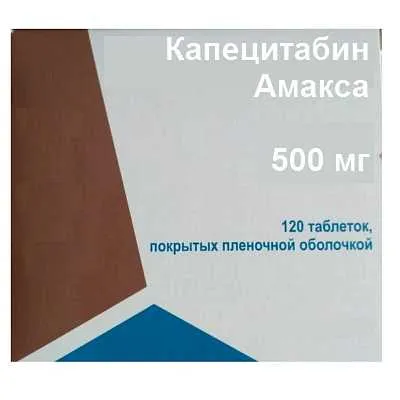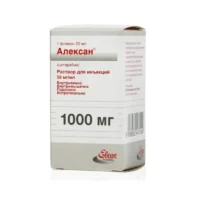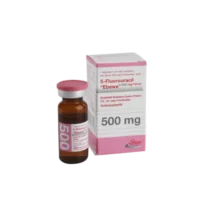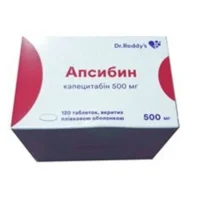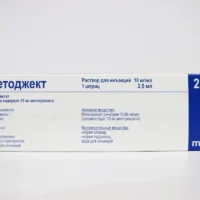Description
Capecitabin Amaxa (capecitabine) Coated Tablets 500 mg. №120
Composition
Active ingredient: Capecitabine 500 mg.
Other ingredients: Microcrystalline cellulose, croscarmellose sodium, hypromellose, lactose monohydrate, magnesium stearate, and purified talc.
Mechanism of Action
Capecitabine, a prodrug, is enzymatically converted to 5-fluorouracil (5-FU) in the body. 5-FU, an antimetabolite, disrupts DNA synthesis and cell division, inducing cell death in rapidly dividing cancer cells.
Pharmacological Properties
Capecitabine exerts its antitumor effect through conversion to 5-FU, inhibiting thymidylate synthase and interfering with RNA and DNA synthesis in cancer cells.
Indications for Use
Capecitabin Amaxa tablets are indicated for the treatment of metastatic breast cancer and colorectal cancer.
Contraindications
Avoid using Capecitabin Amaxa tablets if there is a known hypersensitivity to capecitabine or any of the excipients in the formulation.
Side Effects
Common side effects may include nausea, vomiting, diarrhea, hand-foot syndrome, and myelosuppression. Patients should be monitored for adverse reactions.
Usage Instructions
Take Capecitabin Amaxa tablets as directed by a healthcare provider. Swallow the tablets whole with water within 30 minutes after a meal.
Benefits Compared to Analogues
Capecitabin Amaxa tablets offer comparable efficacy to intravenous 5-FU with a more favorable safety profile and the convenience of oral administration.
Suitable Patient Groups
Capecitabin Amaxa tablets are suitable for adult patients with metastatic breast cancer and colorectal cancer. Dosage adjustments may be necessary for elderly patients or those with renal impairment.
Storage and Shelf Life
Store Capecitabin Amaxa tablets in a cool, dry place below 25°C. Protect from moisture and light. Check the expiry date on the packaging and do not use after the stated shelf life.
Packaging Description
Each package contains 120 coated tablets of Capecitabin Amaxa, each tablet containing 500 mg of capecitabine. The packaging is designed to maintain product integrity and protect from external factors.
Clinical Evidence and Proven Effectiveness
In clinical trials, Capecitabine has demonstrated efficacy in metastatic breast cancer and colorectal cancer treatment. Studies have shown improved overall survival rates and quality of life in patients. Its mechanism of action and tolerability make it a valuable option in cancer therapy.

